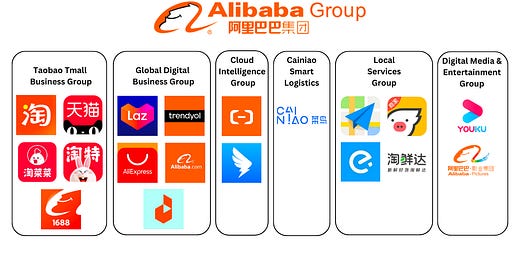Growth Dragons Weekly: Why Alibaba Should Sell InTime, Ele.me and BYD Should Trade 800% Higher
Here’s what happened in Growth Dragons this week:
Why Alibaba Should Sell InTime, Ele.me and More
BYD Will Be Worth 800% Higher If It Were a U.S. Company
CATL Secures Didi Partnership for Battery Swapping Service
U.S. Targets Chinese Biotech Stocks
#1 Why Alibaba Should Sell InTime, Ele.me and More
Alibaba, under its newly appointed leadership, has embarked on a new strategic direction. The company is increasingly focusing on its core divisions: online retail and cloud computing, signaling a potential divestment of non-core businesses.
For instance, there are rumors about the sale of InTime, a physical retailer acquired in 2017 for $4 billion by Alibaba's former CEO, Daniel Zhang. The current management recognizes that enhancing the business's value does not come from diversification but from concentrating on core areas. Given the downturn in China's stock market and the slowdown in consumer spending, selling InTime at its acquisition cost appears unlikely.
Another subject of speculation is the potential divestment of Ele.me, China's second-largest food delivery platform, trailing behind Meituan, which holds approximately 70% market share compared to Ele.me's 27%. Over the years, Ele.me has seen its market share diminish. As part of the Local Services Group—which contributes a mere 6% to Alibaba’s overall revenue—Ele.me isn’t significant.
Despite Alibaba's denials of these rumors, divesting these non-core businesses seems to be a sound strategic move. The company could benefit from selling off units within the Local Services Group and the Digital Media & Entertainment Group, which together account for 9% of total revenue. These units are not market leaders and would require substantial investment and risk to challenge established competitors. By divesting, Alibaba could reallocate resources and management focus towards expanding its China and international e-commerce presence (especially Lazada and Trendyol), supported by its logistics network, Cainiao, and its cloud business, including enterprise solutions like DingTalk.
The diversification strategy, pursued when Alibaba's e-commerce operations were flourishing, aimed at expanding the company's footprint across various industries, solidifying its status as a comprehensive Big Tech entity in China. However, regulatory scrutiny over companies gaining excessive influence, combined with escalating competition, has left Alibaba in a vulnerable position, burdened by numerous unrelated and underperforming investments. These have become more of a liability than assets, diverting management's attention from core objectives. We endorse Alibaba's strategy to divest and refocus, streamlining its operations for better efficiency and growth.




